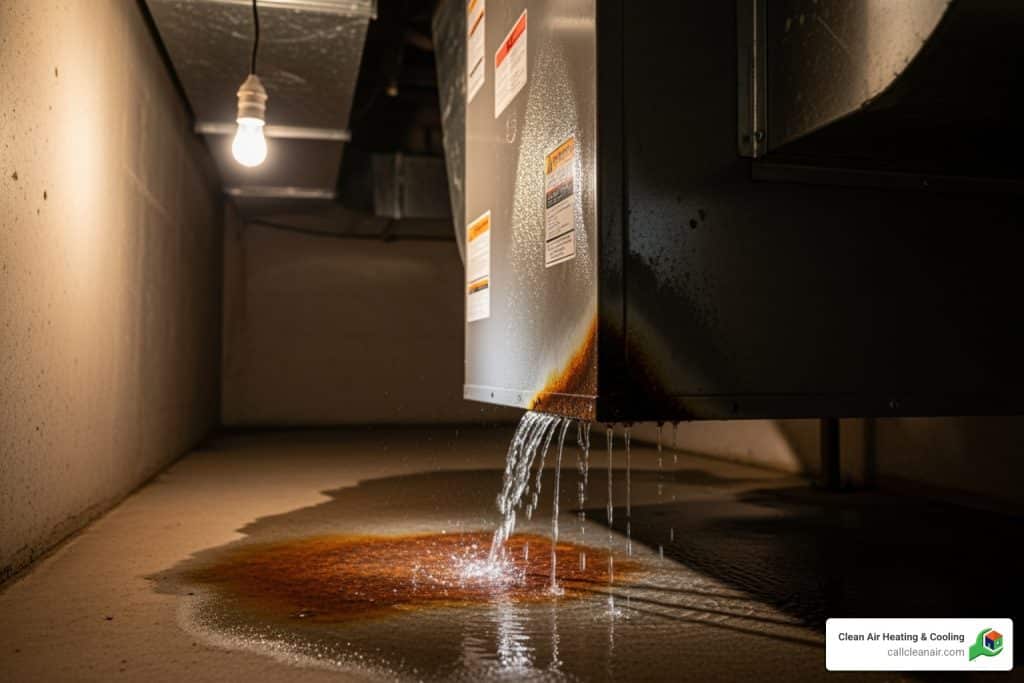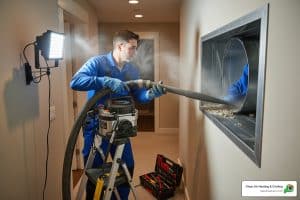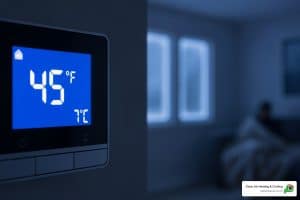Why Your AC Unit Leaking Water Demands Immediate Attention
When your AC unit is leaking water, it’s more than an annoyance; it’s a warning sign that requires immediate attention. Here’s what you need to know:
Most Common Causes:
- Clogged drain line – Algae, dirt, or debris blocking water flow
- Dirty air filter – Restricts airflow, causing coils to freeze and overflow
- Damaged drain pan – Cracks or rust allow water to escape
- Frozen evaporator coil – Ice melts faster than the drain can handle
- Faulty condensate pump – Can’t remove water from basement units
Immediate Steps:
- Turn off your AC system at the thermostat
- Check if water is clear (condensation) or oily (refrigerant leak)
- Clean up standing water to prevent damage
- Replace dirty air filters if accessible
Leaking water can damage floors, walls, and ceilings and encourage mold growth. Fortunately, many causes are simple to fix if caught early.
I’m Colin Matei, Owner of Clean Air Heating & Cooling. For years, I’ve helped Bellingham area homeowners solve AC unit leaking problems, preventing costly water damage and restoring comfort. Proper diagnosis and timely repairs are key.
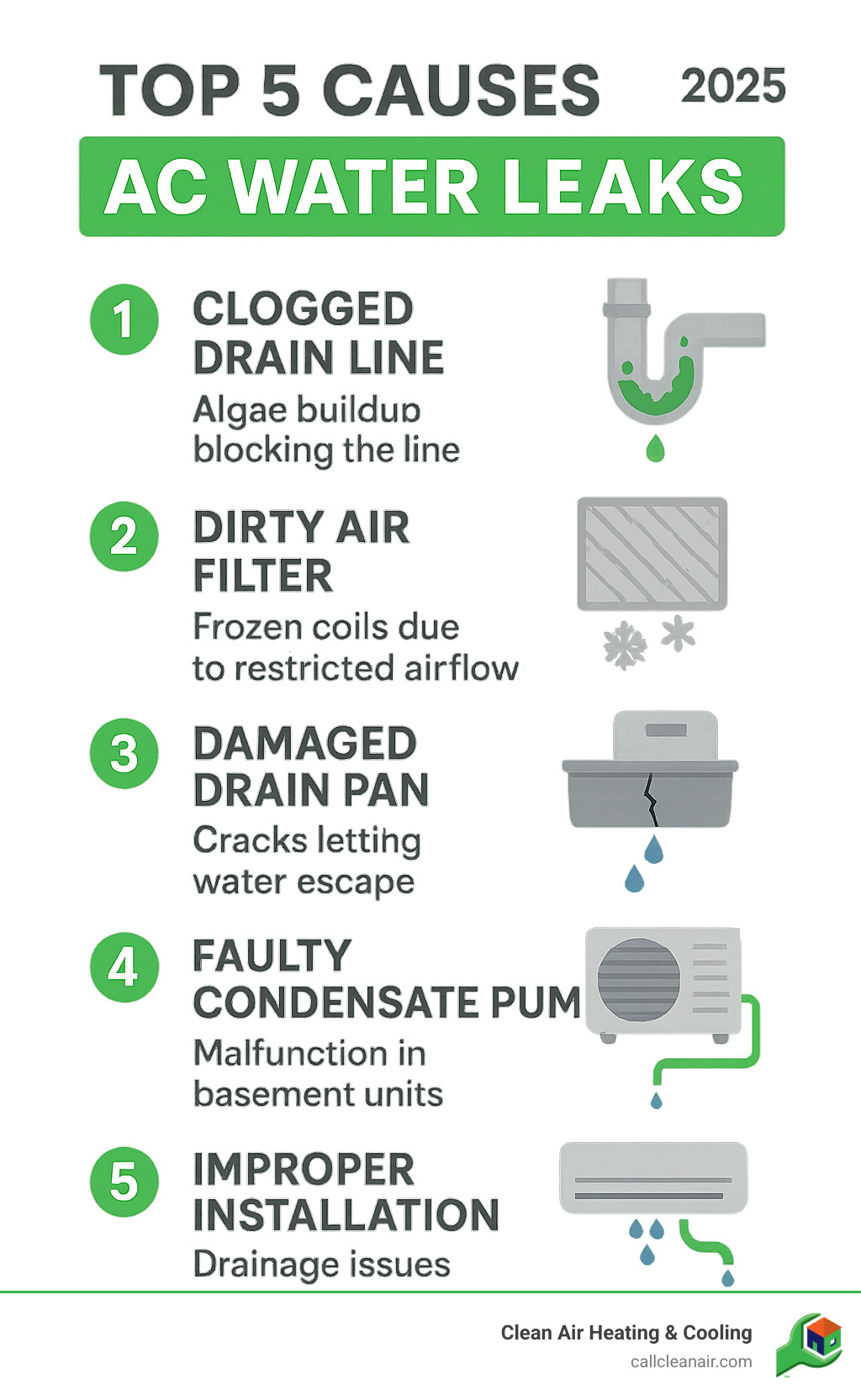
The Science of Sweat: How Your AC Manages Condensation
Your air conditioner battles heat and humidity, but when your AC unit is leaking water, this seamless process has been interrupted. Your AC removes heat and humidity from indoor air at the evaporator coil, a super-cold component inside your indoor unit.
As warm, humid air flows over the cold coil, moisture condenses into water droplets. This dehumidification process cools your air and removes humidity. This condensed water drips into the primary drain pan located beneath the evaporator coil.
From there, gravity guides the water through a drain line (usually PVC or copper) safely out of your home. Many units also have a secondary drain pan as a backup to catch any overflow, which is especially important for units in attics.
For basement units where gravity isn’t enough, a condensate pump actively pushes water out. Understanding how this condensate drain line and pan system works is the first step in diagnosing why your AC unit is leaking water. For a deeper dive, see our guide on How Does an Air Conditioner Work?
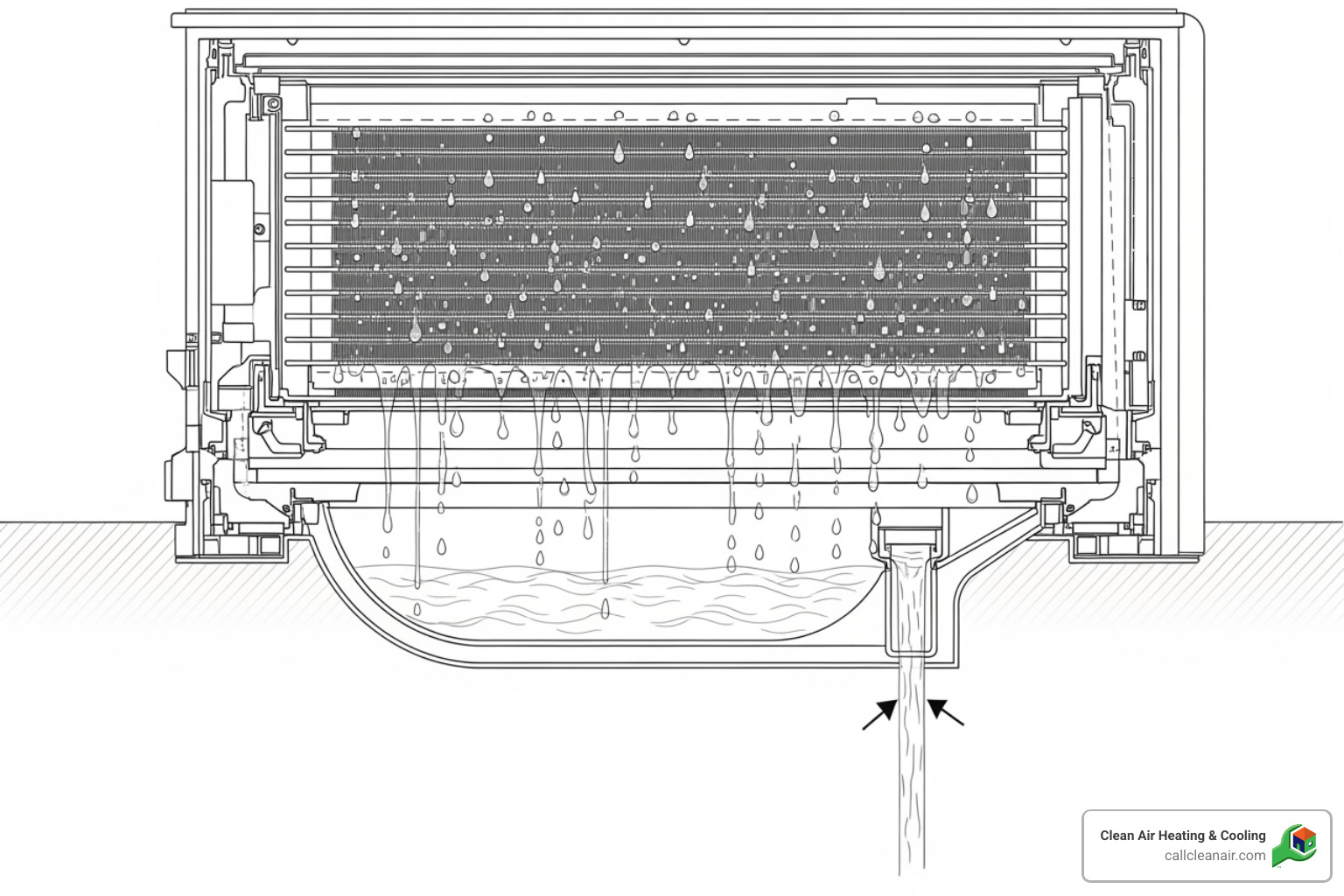
Diagnosing the Drip: Is It Water or Refrigerant?
When your AC unit is leaking, you must first identify the fluid. A water leak is damaging, but a refrigerant leak is more hazardous. Here’s how to tell them apart.
Water leaks are typically clear, odorless liquid, though it may look dirty. Signs include puddles, water stains, musty smells, dripping sounds, and increased humidity.
Refrigerant leaks are more serious. Look for warm air from vents, hissing or bubbling sounds, and an oily residue near coils or connections. Some refrigerants have a sweet, chemical smell, but many are odorless.
| Feature | Water Leak | Refrigerant Leak |
|---|---|---|
| Symptoms | Visible puddles, water stains, increased indoor humidity, musty odors, dripping sounds. | Reduced cooling efficiency, AC blowing warm air, hissing or bubbling sounds, ice buildup on coils, higher electricity bills. |
| Appearance | Clear, odorless liquid. May appear dirty if it picks up debris. | Clear, but often accompanied by oily residue around the leak point (as some refrigerants contain oil). |
| Smell | Odorless, or a musty smell if mold is present. | Often described as a sweet, chemical odor. (Note: Many modern refrigerants are odorless, so don’t rely solely on smell.) |
| Dangers | Property damage (floors, walls, ceilings), mold/mildew growth, electrical shorts if near wiring. | Environmental hazard, potential health risks (irritation, headaches, dizziness, nausea from exposure), severe system damage, can lead to compressor burnout. |
Immediate Action: Turn off your AC at the thermostat and the circuit breaker. This prevents electrical shorts and further system damage. Water damage can ruin floors, walls, and ceilings, while moisture encourages mold growth. If you see other issues, review our guide on Signs My HVAC System Needs Repair.
Common Causes of an AC Unit Leaking Water
Most water leaks from an AC unit stem from a failure in the condensation management system. Here are the common culprits:
Clogged condensate drain line: This is the most common cause. Algae, dust, and debris can create a blockage, causing water to back up and overflow the drain pan. Learn more in our guide: AC Drain Line Clogged.
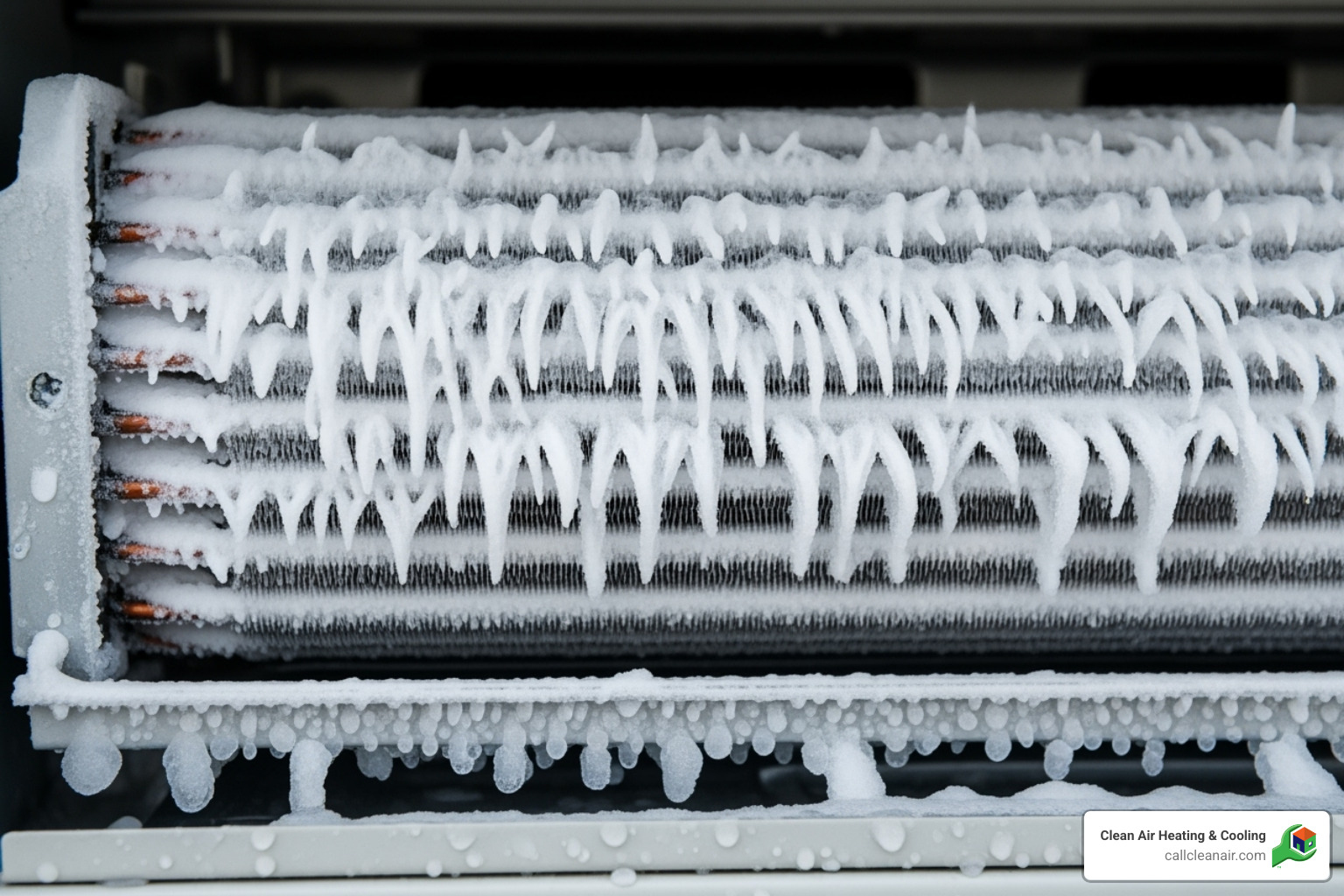
Damaged drain pan: Over time, drain pans can crack or rust, especially in units over 12-15 years old. A damaged pan will leak water directly onto the surrounding area.
Frozen evaporator coils: Restricted airflow or low refrigerant can cause the evaporator coil to freeze. When the ice melts, the sudden rush of water can overwhelm the drain system.
Dirty air filter: A clogged filter restricts airflow, causing the evaporator coil to freeze. As the ice melts, the drain pan overflows. Change your filter every 30-90 days to prevent this.
Improper installation: If the unit isn’t level, the drain pan isn’t sloped correctly, or drain lines are poorly connected, water won’t drain properly and will cause leaks.
Malfunctioning condensate pump: In basement units, a failed pump can’t remove water, causing it to back up and overflow the drain pan.
What to Do if You Suspect Your AC Unit is Leaking Refrigerant
A refrigerant leak is more serious than a water leak and requires a professional. Unlike water from condensation, refrigerant is not consumed during operation; a low level always indicates a leak.
Warning signs include: poor cooling or warm air, hissing or bubbling sounds, and an oily residue on coils or connections. Ice on the coils and rising energy bills are also signs, as low refrigerant prevents the coil from absorbing heat properly, causing it to freeze.
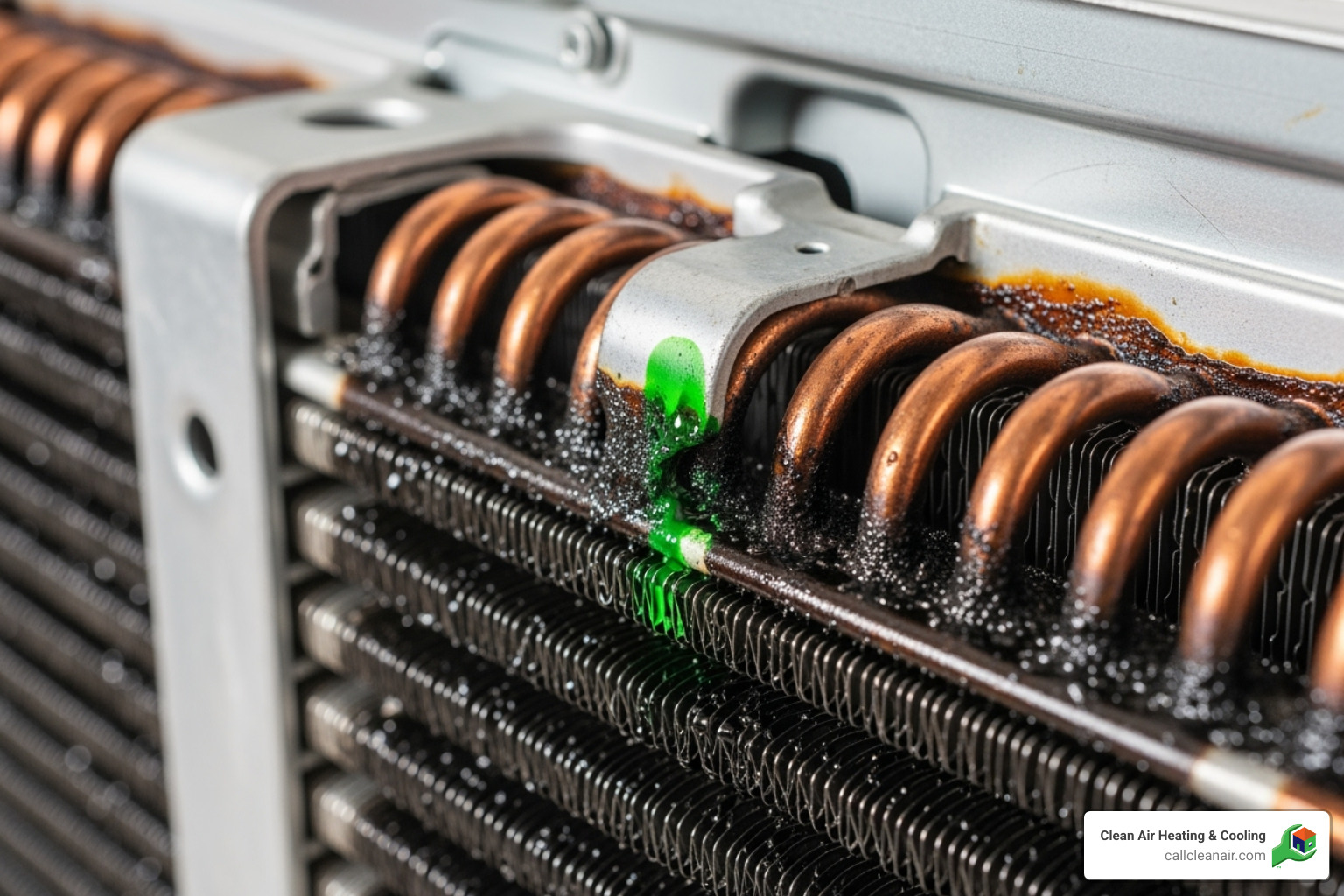
Causes of leaks include: improper installation with loose connections, corroding pipes (formicary corrosion), worn seals and valves, and damaged coils from physical impact or temperature changes.
Important: Do not attempt to fix a refrigerant leak yourself. Handling refrigerants requires an EPA license due to health risks and potential fines. Turn off your unit and call a certified professional. We use specialized equipment to find and repair leaks safely. For related issues, our AC Compressor Repair service can help.
Your First Line of Defense: DIY Troubleshooting Steps
Many water-related AC unit leaking problems have simple DIY solutions, but refrigerant leaks always require a professional. These first-aid steps can save you time and money.
Turn off the power. For safety, switch your thermostat to “Off” and turn off the AC’s circuit breaker at your electrical panel. Water and electricity are a dangerous mix.
Check your air filter. A clogged filter is a common cause of leaks. It restricts airflow, causing the evaporator coil to freeze and then overflow when it melts. If your filter is dirty, replace it.
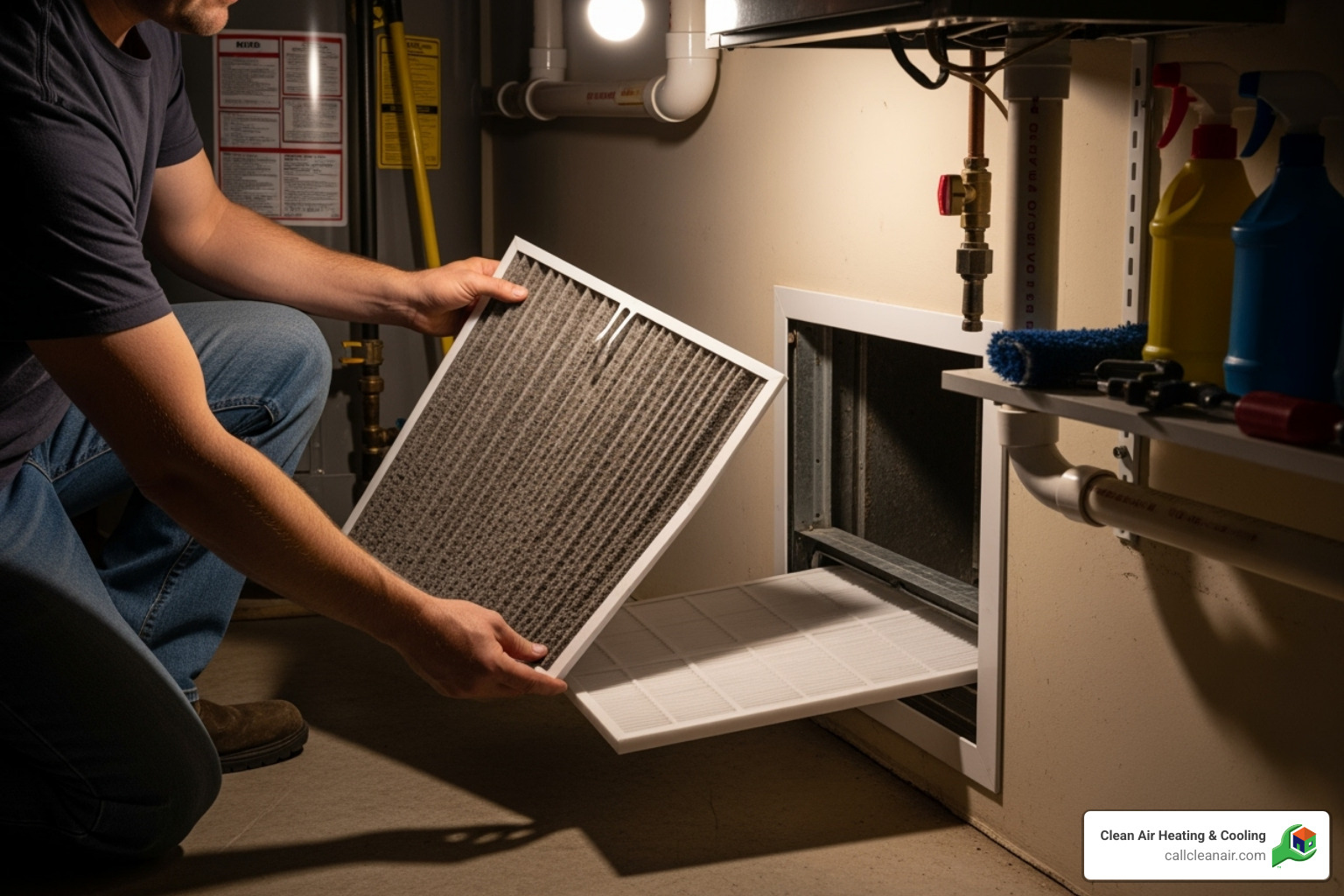
Inspect the drain pan. Look for standing water, cracks, or rust. Standing water in an undamaged pan points to a clogged drain line. A cracked pan requires professional repair.
Clear the condensate drain line. Most water leaks are caused by a clogged drain line (a PVC pipe running from your indoor unit). Use a wet/dry vacuum at the exterior end of the line to suck out the clog. Then, pour a 50/50 mix of distilled white vinegar and water down the line’s access point (a T-shaped vent) to kill algae. Avoid using bleach. For more details, see this guide on clearing a clogged condensate drain.
Thaw a frozen coil. If you see ice, keep the power off but turn the thermostat’s fan to “On” to circulate air and melt the ice. This can take several hours to a full day.
Check for external blockages. Ensure the end of the drain line outside is clear of leaves, dirt, or other obstructions.
After these steps, turn the system back on. If it still leaks, it’s time to call a professional.
When to Call the Pros for an AC Unit Leaking
Despite your best DIY efforts, some AC unit leaking problems require a professional. Knowing when to call for help can save you money and frustration.
Persistent leaks: If you’ve tried the DIY steps and the leak continues, it’s time to call a pro. The problem may be a stubborn blockage or damage to an internal component.
Poor cooling performance: If the leak is accompanied by warm air from your vents, it could be a refrigerant issue. Handling refrigerant is not a DIY job and requires an EPA-certified technician.
Signs of a refrigerant leak: A chemical smell, hissing sounds, or oily residue are red flags that require immediate professional service due to health risks.
Electrical issues: Flickering lights, tripped breakers, or burning smells are serious signs. Turn off the system immediately and call an expert.
Mechanical noises: Banging, grinding, or rattling can indicate a failing component, like the condensate pump or fan motor, which needs professional diagnosis.
Repair costs for a leaking AC vary based on the cause, from a simple drain cleaning to a complex refrigerant leak repair. The age and condition of your unit also affect the cost and whether repair or replacement is the better option.
At Clean Air Heating & Cooling, our Air Conditioning Repair Service provides a thorough diagnosis and honest recommendations. We offer an AC Repair Free Estimate to help you make an informed decision. When DIY fails or the issue involves refrigerant, electrical, or mechanical problems, call a professional for a safe and correct repair.
Preventative Care: How to Avoid Future AC Leaks
Preventing your AC unit from leaking is easier and cheaper than fixing it. Based on my experience serving Whatcom, Skagit, Snohomish, and San Juan Counties, regular maintenance is the key to avoiding emergency repairs.
Change filters regularly. A clean filter is the best defense against leaks. Clogged filters restrict airflow, causing coils to freeze and overflow when they melt. Check your filter monthly and replace it every 30-90 days. This also helps your system run efficiently and reduces utility bills.
Schedule annual professional tune-ups. Each spring, a technician can perform a thorough inspection to catch problems early. This includes cleaning coils, flushing the drain line, checking refrigerant levels, and inspecting the drain pan. Find out more about our AC Tune Up Near Me services.
Keep coils clean. Clean coils prevent freezing. Between tune-ups, you can gently rinse the outdoor unit’s fins with a garden hose to remove debris. Always turn off the power first.
Perform drain line maintenance. Every few months, pour a half-cup of distilled white vinegar down the drain line’s access point to prevent algae growth and clogs.
Ensure proper installation. A new system must be installed correctly—level and with properly sloped drain lines—to prevent future leaks. Always choose a reputable HVAC contractor.
Investing in our HVAC Maintenance Plans prevents leaks, lowers energy bills, and provides peace of mind. Learn more about the Benefits of Regular HVAC Maintenance.
Frequently Asked Questions about Leaking AC Units
Here are answers to the most common questions I get about a leaking AC unit from homeowners in Whatcom, Skagit, Snohomish, and San Juan Counties.
Can a leaking AC unit be safely used while awaiting repair?
The short answer is no, it is not safe to run a leaking AC unit. Continuing to run the system creates several risks:
- Electrical Shock and Fire Hazards: Water contacting electrical components is a primary concern.
- Further Water Damage: A small drip can quickly cause extensive damage to your home’s floors, walls, and ceilings.
- Complete System Failure: If the cause is low refrigerant, running the unit can destroy the compressor, leading to a much more expensive repair.
My advice: turn the system off at the thermostat and circuit breaker immediately. It’s better to be uncomfortable for a short time than to face major damage.
What are the biggest dangers of a leaking AC unit?
Ignoring a leaking AC unit can lead to several serious dangers:
- Property Damage: Water can warp floors, ruin drywall, and stain ceilings far from the initial leak.
- Mold and Mildew: The moisture creates a breeding ground for mold, which can cause musty odors and trigger respiratory problems.
- Electrical Hazards: The combination of water and electricity poses a serious risk of short circuits and house fires.
- System Failure: Ignoring the problem forces the AC to work harder, which can lead to the failure of expensive components like the compressor.
How does improper AC installation contribute to leaks?
Many leaks are the direct result of poor installation. Here are the most common mistakes:
- Incorrect Leveling: If the indoor unit isn’t perfectly level or angled slightly toward the drain, water will pool and overflow the drain pan.
- Undersized Drain Pan: A pan that is too small for the unit’s capacity will overflow during humid weather.
- Poorly Sealed Connections: Loose or improperly sealed drain line connections will leak water.
- Improper Refrigerant Charge: An incorrect refrigerant level can cause the coils to freeze, leading to water leaks when the ice melts. This is why professional installation is critical.
Stop the Drip with Professional HVAC Service
When your AC unit is leaking persistently, it’s time for professional help. This guide has covered how your AC works, how to identify different leaks, and what DIY steps you can take.
We’ve discussed common causes like clogged drains, dirty filters, and frozen coils. While some are simple fixes, others signal deeper issues requiring a certified technician.
Prompt action is crucial to prevent extensive water damage, mold growth, electrical hazards, and complete system failure. A small leak can quickly become a costly problem for your AC and your home. The benefits of professional repair include accurate diagnosis with specialized tools, safe refrigerant handling, and identifying the root cause to prevent future leaks.
At Clean Air Heating & Cooling, we provide prompt, reliable service to restore your comfort and peace of mind. Serving Snohomish, Whatcom, Skagit, and San Juan Counties, our team is dedicated to preventing costly water damage for local families.
Whether the leak is new or you’ve tried DIY fixes without success, we can help. Our experienced technicians will diagnose and repair your AC unit leaking issue quickly and effectively.
Don’t let a small drip turn into a big headache. For expert AC repair in Snohomish County and surrounding areas, contact us today! Let’s work together to stop the drip and restore your peace of mind.

